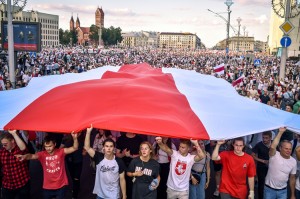Protests in Belarus

Protesters display the red and white flag of Belarus during a demonstration against the country’s president, Alexander Lukashenko, on Aug. 16, 2020, in Minsk. Widespread unrest erupted in the country after Lukashenko claimed victory in a reelection widely seen as rigged.
Credit: © Sergei Gapon, AFP/Getty Images
Mass protests have erupted in Minsk, Belarus, in response to the reelection of longtime president Alexander G. Lukashenko in an election that many consider to have been rigged. The election was widely considered unfair, particularly as Lukashenko had ordered the imprisonment of opposition leaders. Protesters demanded an end to what many consider a dictatorship, a form of government in which an individual, committee, political party, or military group holds absolute political power.
The protests began in early August, shortly after Lukashenko claimed victory on Aug. 9, 2020. Thousands of protesters filled Minsk’s city center, and many of them were sprayed with tear gas. Many protesters were also arrested or detained (held captive). Widely shared video recordings of security forces brutally attacking peaceful demonstrators led to mass strikes at state-owned companies.
Belarus, also spelled Byelarus, is a country in eastern Europe. Minsk is its capital and largest city. A Communist government was established in Belarus in 1919. Communism is a political and economic system that is characterized by government ownership of land and capital (wealth). Belarus became a republic of the Soviet Union in 1922. It remained a Soviet republic until 1991, when it declared its independence.
Alexander Lukashenko became president of Belarus in 1994, the same year the country adopted a new constitution. In 1996, however, Lukashenko pushed through a referendum for a new constitution that would expand his power. The referendum, which passed, extended Lukashenko’s term to 2001 and gave him increased control over every branch of government. Opponents of Lukashenko said the vote had been falsified. They accused him of establishing a dictatorship and limiting the freedoms of the people.
Lukashenko was reelected in 2001. However, government officials interfered with the campaign of his opponent. Independent observers of the election claimed the vote was unfair. These claims of unfairness have followed Lukashenko’s victories in the country’s 2006, 2010, 2015, and 2020 elections.


